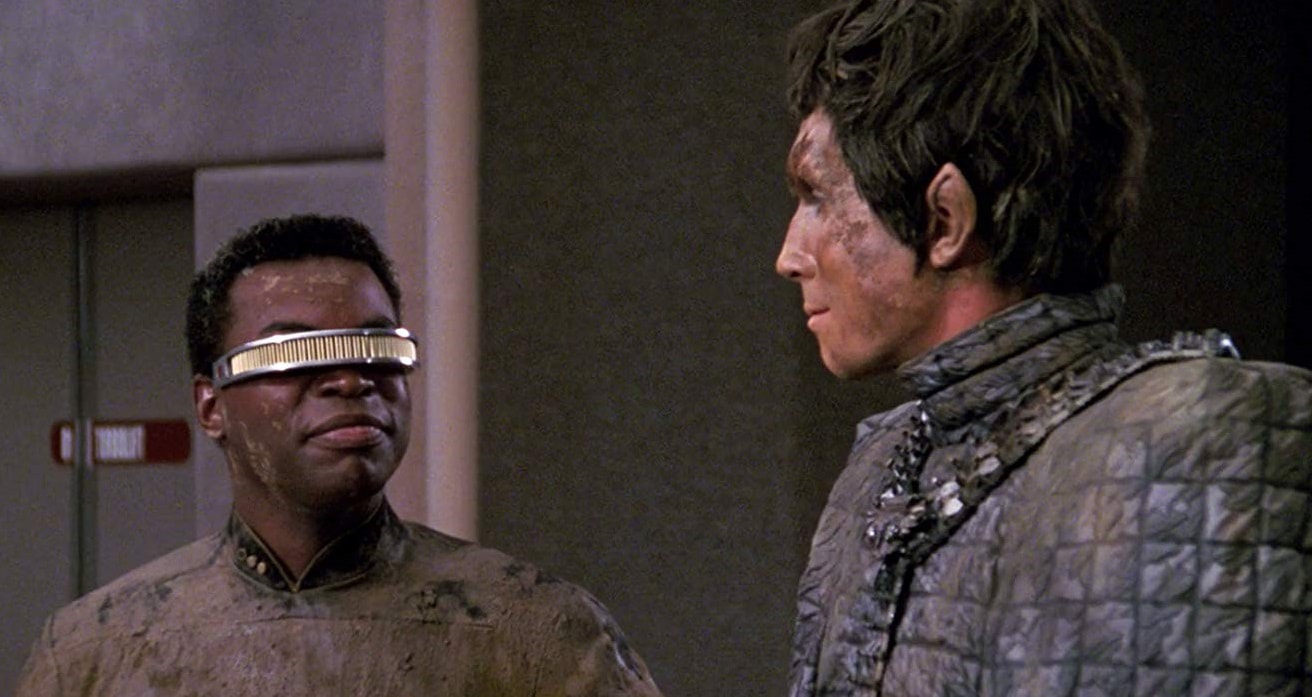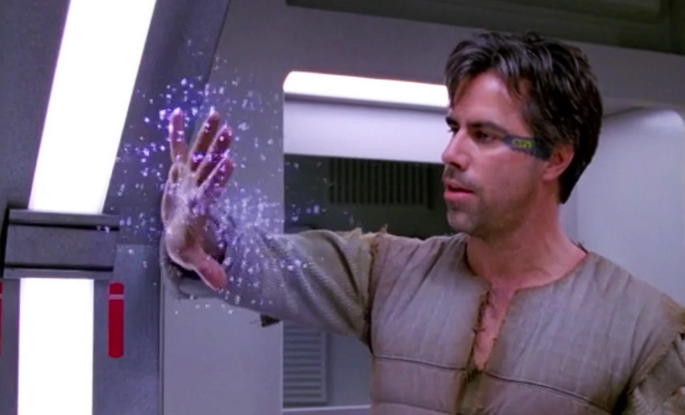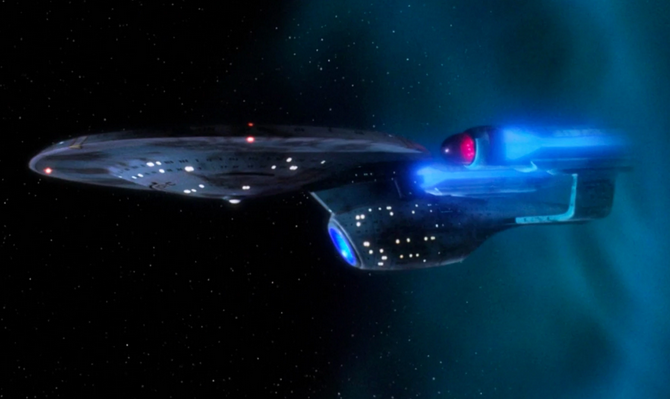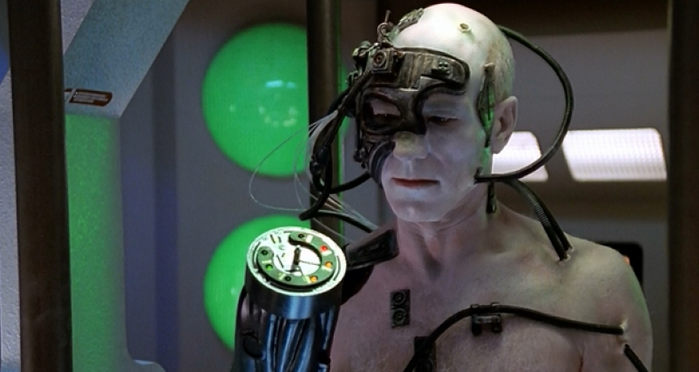|
Belatedly continuing on from my looks at season 1 and season 2 of The Next Generation, here I'll be giving some brief thoughts on season 3. It's often thought that this is the season when TNG really began to fire on all cylinders, but for me the first half of it is dominated by very average episodes. Things do step up a gear in the second half, and builds towards the widely acclaimed two-part story "The Best of Both Worlds", which I'll deal with in its entirety here, even though its second part is actually the first episode of season 4. Season 3's episodes are set in 2366, the third year of the Enterprise-D's mission. Notably, Beverley Crusher returns as ship's medical lead after her unfortunate absence in season 2. Several characters introduced here will recur in later seasons, including rogueish archaeologist Vash, Romulan commander Tomalak, and the villanous Klingon warlord Duras. While TNG never really does full-blown story arcs as we know them, there are some recurring threads which begin in season 3. One is the Federation's very uneasy relationship with the warlike Romulans, who appear in three episodes. Another is the machinations of Duras, an enemy of Worf who has designs on seizing power within the Klingon Empire. These threads will join together in season 4. In any case, there are 26 episodes to look at, and little time to waste - engage! S3E1 "Evolution" (4/10) Very likely the best series opener so far, "Evolution" still isn't particularly special. Wesley allows a pair of nanites to escape confinement and they damage the ship, jeopardising a research mission. The plot is serviceable but not emotionally or visually interesting, and the episode is certainly not very momentous or memorable for a series opener. Still, production value is notably higher than before and the uniforms have improved. S3E2 "The Ensigns of Command" (5/10) A quite good Data-centric episode. The android is required to persuade a group of stubborn colonists to abandon their doomed planet, and must use every bit of his grasp of human nature to do so. Given the theme of persuasion, the episode is expectedly talky but does deliver some action late on. The aliens threatening the colony are refreshing in that they are non-humanoid, albeit barely seen. S3E3 "The Survivors" (4/10) The Enterprise finds that the colonists of Delta Rana IV have been annihilated, with the exception of an elderly couple. The episode maintains an inscrutable mystery for almost all of its length, and while the reveal is quite emotionally affecting the story is full of logical lapses and repetition. Like so many early episodes, this one has a fairly good concept which isn't often executed very effectively. S3E4 "Who Watches the Watchers" (4/10) A Federation observation post on Mintaka III is exposed to the native population by an accident. Riker and Troi must go undercover as locals in a bid to contain the breach of the Prime Directive. Ray Wise is a notable guest star, but his role isn't particularly engaging. There are some interesting philosophical dimensions when Picard is regarded as a god, but the episode is too inert and talky to be memorable. S3E5 "The Bonding" (4/10) The ship's archaelogist is killed by a weapon left over from a long-ended war, leaving her son an orphan. The episode begins with some genuinely interesting musing on death and grief from philosophical, emotional and sociological perspectives. However, when a sci-fi spin is put on all of this - when an energy being attempts to replace the dead woman - the episode devolves into a humdrum alien-of-the-week story. S3E6 "Booby Trap" (4/10) The Enterprise discovers an ancient alien vessel, but becomes trapped in the same elaborate minefield. The basic plot is similar to the previous episode, as both deal with leftover weapons from long-forgotten conflicts. The ship becomes immobile, and the story is also fairly inert for much of its length. La Forge's dealings with a simulation of the ship's designer, and Picard's manual piloting of the Enterprise out of the minefield are both good. S3E7 "The Enemy" (6/10) In the best episode of season 3 yet, the lives of two Enterprise crewmen each become entwined with a Romulan. Following a crash, La Forge becomes trapped on a hostile planet with one; Worf is the only one who can save the life of another. The return of the Romulans to the show is welcome, and the theme of overcoming enmity to co-operate is fertile ground for Star Trek. The bridge standoff makes for a good, tense conclusion. S3E8 "The Price" (6/10) The Enterprise plays host to a bidding war for an apparently stable, and therefore valuable, wormhole leading to the Delta quadrant. While it has logical lapses, this is a very intelligent episode about the outwardly sterile concept of interstellar trade. Riker and Troi both get great moments dealing with the slimy freelance negotiator Ral - who Troi falls for despite his being exceptionally creepy. Another instance of above-average early season 3. S3E9 "The Vengeance Factor" (5/10) The Enterprise is required to help secure a truce between two warring factions on Acamar III, but this process is threatened by an assassin pursuing a blood feud. While it provides a fun phaser battle and tense diplomacy, this episode reveals its mystery a little too early and obviously to approach its potential. By this point in season 3, it's clear that war and conflict are an increasingly major theme for the show. S3E10 "The Defector" (6/10) The Enterprise is met by a Romulan defector who claims that the Empire will soon launch a devastating attack on the Federation. The guest star playing defector Jarok, James Sloyan, is excellent and the story does fine job of maintaining its central mystery for some time. The climax, in which the Klingons come to the Enterprise's aid, is excellent even if the climactic bridge standoff is becoming something of a trope. S3E11 "The Hunted" (8/10) Adequacy has been the watchword of season 3 up to this point, but that changes with "The Hunted" - an out-and-out excellent episode. The Enterprise visits Angosia III, a candidate world for joining the Federation, and encounters an exceptionally skilled wanted criminal. Roga Danar is played wonderfully by Jeff McCarthy and provides a thrilling challenge for the Enterprise - better yet, the exciting story exposes numerous good ideas. S3E12 "The High Ground" (6/10) TNG takes on the thorny subjects of terrorism and political violence. This episode was one response to requests for more action-oriented stories, and does deliver a lot of slam-bang action. However, the subject demanded some worthwhile points to be made and the script struggles to provide these. Still, the guest stars, Gates McFadden and Patrick Stewart are all very good in their roles. S3E13 "Deja Q" (7/10) The terrific "Q Who" from last season may have been named for the powerful trickster, but was dominated by the Borg. "Deja Q" is a truly Q-focused episode, and a very good one in its own right. Q is deprived of his powers by the Continuum, and seeks refuge on the Enterprise. The opportunities for humour are exploited with skill, and John de Lancie has never been better in the role. The relationship between Q and Data is another highlight. S3E14 "A Matter of Perspective" (5/10) From time to time, Star Trek transparently takes direct inspiration from another work of fiction, and so it is with "A Matter of Perspective" which lifts from the 1950 film Rashomon. Riker is accused of murder, and the holodeck is used to try to get to the truth. This deployment of the holodeck is novel, but the story leans too heavily on technobabble and there's little in the way of emotional impact. S3E15 "Yesterday's Enterprise" (8/10) The USS Enterprise-C emerges out of the past, encountering the Enterprise-D and changing it dramatically due to the altered timeline - but only Guinan notices the shift. An excellent episode which makes a potentially confusing concept intelligible and eventually provides some real emotional impact. The story is very meta: the Enterprise(s) seek to alter history, but the episode itself also works to give Tasha Yar a meaningful death - and succeeds. S3E16 "The Offspring" (6/10) Not in fact a punk-themed episode, but rather an ethically complex one in which Data produces an android "child". The idea is implausible, in that Data has done this in secret, alone, and apparently in a short time but there are some very amusing exchanges as well as a genuinely moving ending. Feels in some ways like an inferior retread of "The Measure of a Man", which it explicitly references - but this is a good episode in its own right. S3E17 "Sins of the Father" (6/10) One of the most popular episodes of season 3, but not one which entirely works. The story is definitely worthy in its extensive investigation of Klingon culture and politics - prompted by the arrival of Worf's hitherto unknown brother. However, while Tony Todd's Kurn is excellent, his appearance isn't met with much dramatic response and the ending is downbeat and feels inconclusive. S3E18 "Allegiance" (7/10) Is "Allegiance" primarily a way to save money by crafting an episode around only one set? Very likely, but it's still a very good entry. Picard is abducted and confined in a room with three other apparently random aliens. Patrick Stewart is excellent in two roles - both Picard and an increasingly unhinged duplicate intended to stall the Enterprise crew. This is very much a bottle episode but a fine example of the form. S3E19 "Captain's Holiday" (6/10) Very relucantly, Captain Picard agrees to take shore leave on Risa. While there, he meets Vash - an archaelogist searching for a mysterious artefact. Taking the Captain out of his element is a naturally good idea and Jennifer Hetrick is good value as Vash, but the episode is an odd clash of the frivolous and the serious that never mesh successfully. Again, Stewart is expectedly excellent. S3E20 "Tin Man" (5/10) Considering "Tin Man" was written as a direct criticism of earlier episodes, it isn't exceptional itself. The Enterprise takes on an extraordinarily powerful telepath in a bid to communicate with a living ship. The inclusion of the Romulans feels somewhat forced, and the living ship idea is an interesting one that isn't taken anywhere particularly worthwhile. The saving grace is Harry Groener, who is very good as Tam Elbrun. S3E21 "Hollow Pursuits" (7/10)
Dwight Schultz makes his first of numerous appearances as Lt. Barclay, a gifted engineer with social issues. Schultz is a fantastic comic actor who is a credit to an episode obviously written around him - but the rest of the cast are also very good in this broadly comic story. Barclay's "holo-addiction" is an interesting new way to explore the holodeck technology, and one which isn't predicated on it malfunctioning. S3E22 "The Most Toys" (8/10) How would the crew cope with Data's apparent destruction? How would Data react to a scenario that places extreme pressure on his programming? These are the issues explored by this superbly-written episode in which Data is captured by obsessive collector Kivas Fajo. Saul Rubinek is first very funny, then extremely sinister as the villain Fajo, and Brent Spiner again excels in another extremely entertaining Data-centric episode. S3E23 "Sarek" (6/10) The appearance of a character from The Original Series - Spock's father, no less! - is a very rare and exciting happening, but is largely wasted in this episode. Sarek's career as a diplomat is ending, but his worsening medical condition spreads chaos in the ship. As has quite often been the case this season, the episode is redeemed at the end. Patrick Stewart is simply incredible in a scene following a mind-meld with Sarek. S3E24 "Menage a Troi" (4/10) The poorest season 3 episode in a long time, this one involves the latest appearances of Lwaxana Troi and the Ferengi. The final scene is very funny, but the primary kidnap plot seems rote and predictable and the jokes often don't land. One key trend in the season has been real personal stakes, but "Menage a Troi" doesn't manage to deliver on its potential promise in this area. (Worst Episode) S3E25 "Transfigurations" (5/10) Dealing with a member of a species who gradually learns of a future for his people that their overlords want to keep concealed, this episode prefigures aspects of the much later Star Trek: Discovery. In itself, this story is not particularly interesting but Crusher's interactions with the remarkable healing abilities of "John Doe" are worthwhile. The visual effects are a mixed bag. S3E26 / S4E1 "The Best of Both Worlds" (9/10) The Borg threat was introduced in season 2, but does not really show its true extent until this widely acclaimed two-parter. Lavishly made and given a limited cinema release, "The Best of Both Worlds" is a tremendously exciting story which is arguably the moment when TNG truly comes of age. Picard's brief but horrifying assimilation into the Borg collective will have long-term consequences. (Best Episode)
0 Comments
Your comment will be posted after it is approved.
Leave a Reply. |
About
I write about classic science fiction and occasionally fantasy; I sometimes make maps for Doom II; and I'm a contributor to the videogames site Entertainium, where I regularly review new games. Categories
All
|




